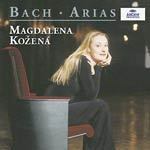
Arias
 $27.00
Special Order
$27.00
Special Order3 - 6 weeks add to cart
J. S. BACH
Arias
Magdalena Kozena (soprano) / Musica Florea / Marek Stryncl
[ Archiv / CD ]
Release Date: Thursday 16 August 2001
This item is only available to us via Special Order. We should be able to get it to you in 3 - 6 weeks from when you order it.
"Here is a richly gifted, highly accomplished young singer - Mozart prize-winner Salzburg 1995, 'Talent of the Year' Prague Award-winner 1996, Vienna Volksoper Clemenza di Tito (Annio) 1997, together with a burgeoning career in concert and oratorio."
(Gramophone)
"Here is a richly gifted, highly accomplished young singer - Mozart prize-winner Salzburg 1995, 'Talent of the Year' Prague Award-winner 1996, Vienna Volksoper Clemenza di Tito (Annio) 1997, together with a burgeoning career in concert and oratorio. She sings her Bach without a great deal of expression, in the Lieder or opera singer's sense, but with due care for phrasing and rhythm, which are more important. Her voice is a fine and beautiful instrument, firmly produced, warm in timbre with a glow on the upper middle notes, sure of pitch. The present deficiency appears to be in true legato: 'appears' because she may be keeping a better legato in reserve for 19th-century music, having been taught that what she gives us here is as much legato as is good for Bach. Understand that there is nothing gross - no aspirates or bumps or tintack hammering. But the notes are too separate and unbound even so. The opening of 'Wie starb die Heldin' illustrates the point; but it is habitual and deprives the music of one of the special pleasures the singing voice should supply. What she does 'sounds all right' (people will say); but listen to Ferrier or Baker, for example, and you hear much more of the true legato which you may think to have heard here.
It is a highly enjoyable recital even so. A notable contribution to its success lies in the stylish playing of Musica Florea, a chamber orchestra using period instruments and led by a conductor whose feeling for Bach's textures and rhythmic life is manifest throughout. Among the cantata arias are some that for many listeners will bring surprise as well as delight: 'Kommt, ihr angefochtnen Sunder' is an invitation to all erring mortals to dance their way to Paradise, and, once there, 'Wohl euch, ihr auserwahlten Seelen' serenely strikes up a dance for the blessed spirits. Magdalena Kozena herself will doubtless be among them. The leaflet's introductory note ends auspiciously: 'A Bach performer steps forward, bringing this glorious music closer to us; in return, we wish a young singer a rich and rewarding life of song.' Amen to that."
Gramophone Magazine August 2000
Tracks:
Magnificat in D major BWV 243
(No.2: Et exsultavit)
Was mir behagt, ist nur die muntre Jagd BWV 208
(No.9: Schafe können sicher weiden)
Ich bin vergnügt mit meinem Glücke BWV 84
(No.3: Ich esse mit Freuden mein weniges Brot)
St. Matthew Passion BWV 244
(No.39: Erbarme dich, mein Gott)
Laß Fürstin, laß noch einen Strahl BWV 198
(No.5: Wie starb die Heldin so vergnügt)
Laß Fürstin, laß noch einen Strahl BWV 198
(No.3: Verstummt!)
O ewiges Feuer, o Ursprung der Liebe BWV 34
(No.3: Wohl euch, ihr auserwählten Seelen)
Wer mich liebet, der wird mein Wort halten BWV 74
(No.2: Komm, komm, mein Herz steht dir offen)
St. John Passion BWV 245
(No.35: Zerfließe, mein Herze, in Fluten der Zähren)
Freue dich, erlöste Schar BWV 30
(No.5: Freue dich, erlöste Schar)
Mass in B minor BWV 232
(No.6: Laudamus Te)
